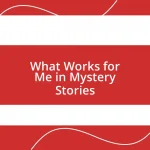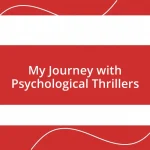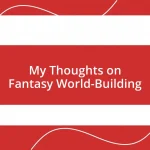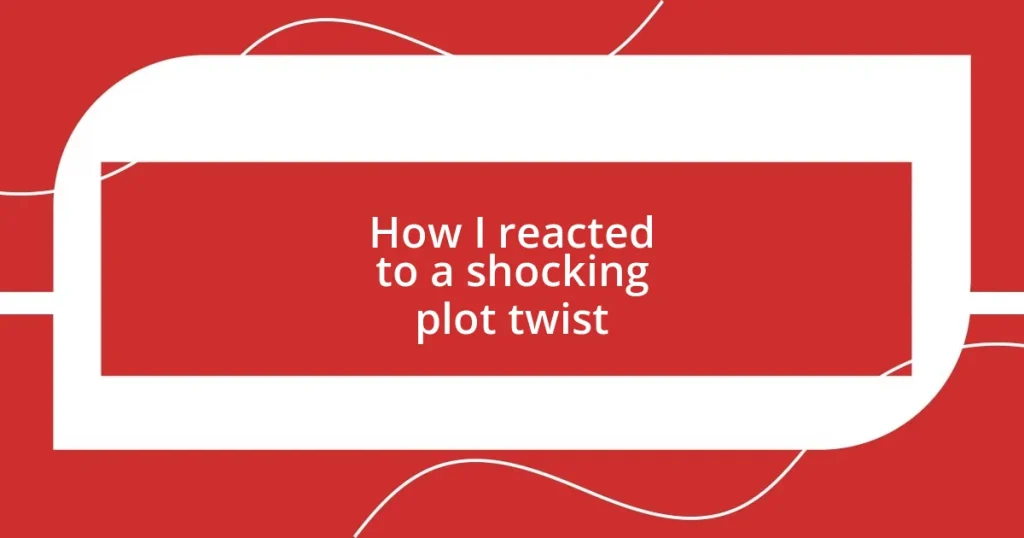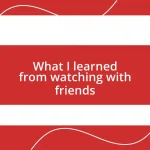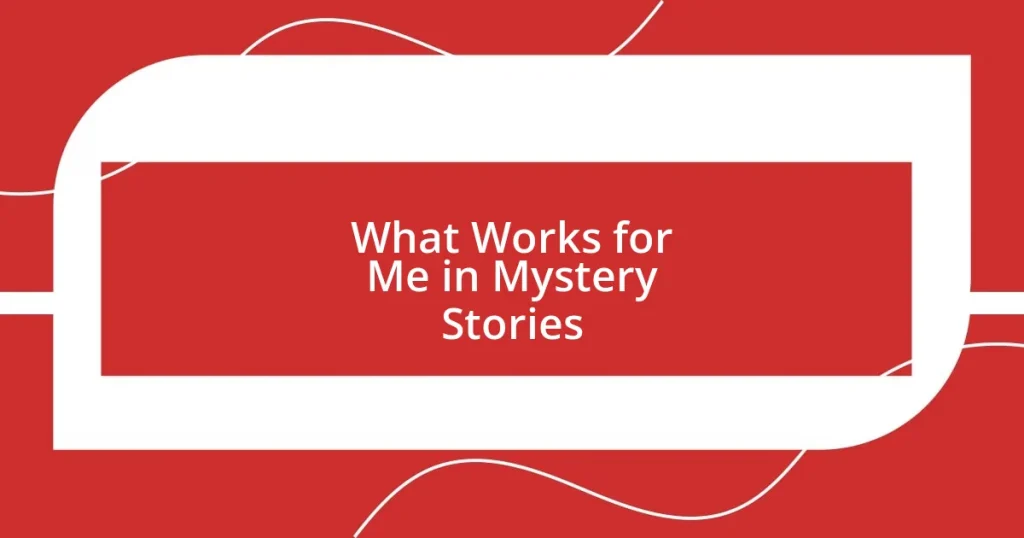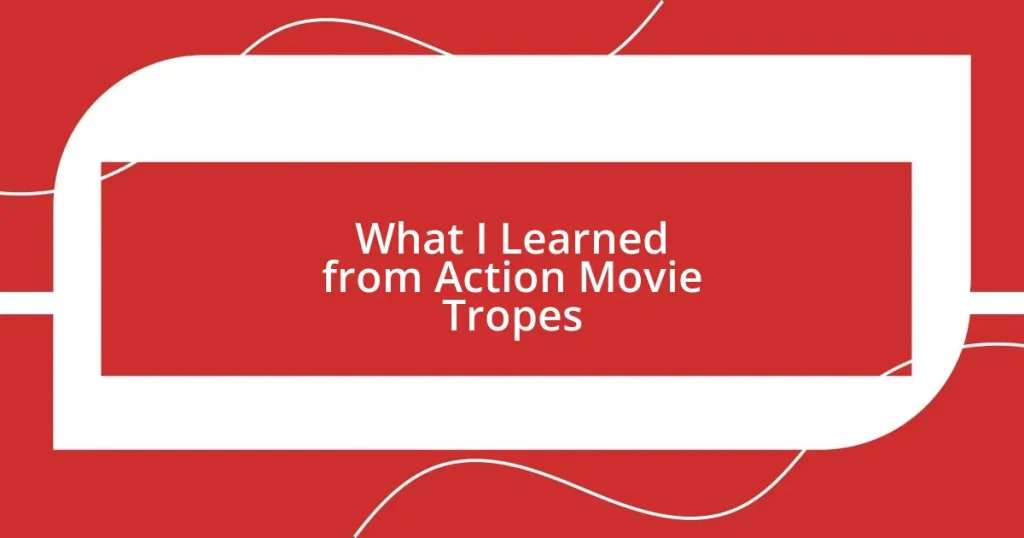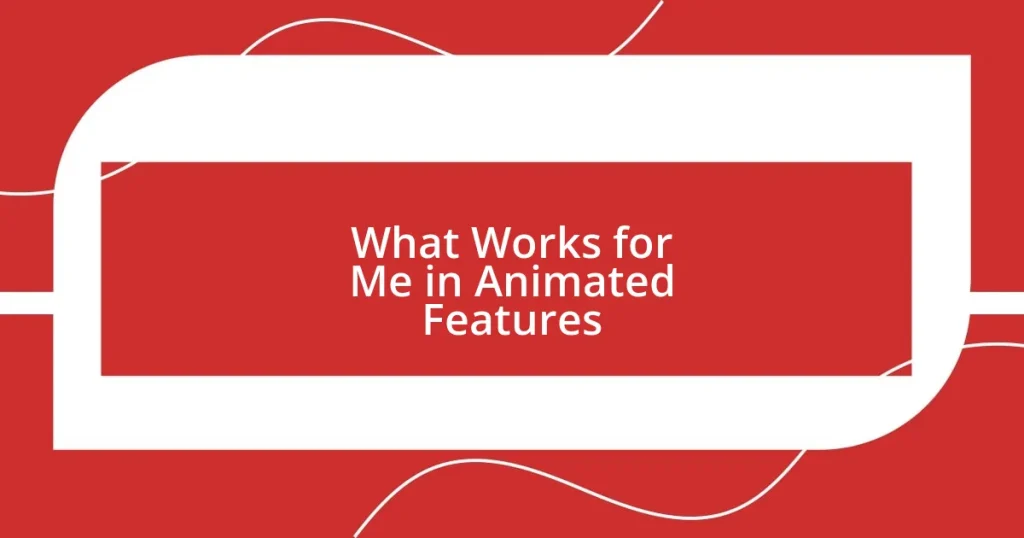Key takeaways:
- Plot twists serve as powerful narrative tools that evoke emotional responses, challenge assumptions, and reflect real-life experiences.
- Initial reactions to plot twists range from shock to excitement, often prompting deep reflection on character motivations and narrative structure.
- Sharing experiences and discussing plot twists with others enhances understanding and appreciation of storytelling.
- Lessons learned from plot twists can influence personal growth and creative practices in writing, fostering a sense of empathy and unpredictability.
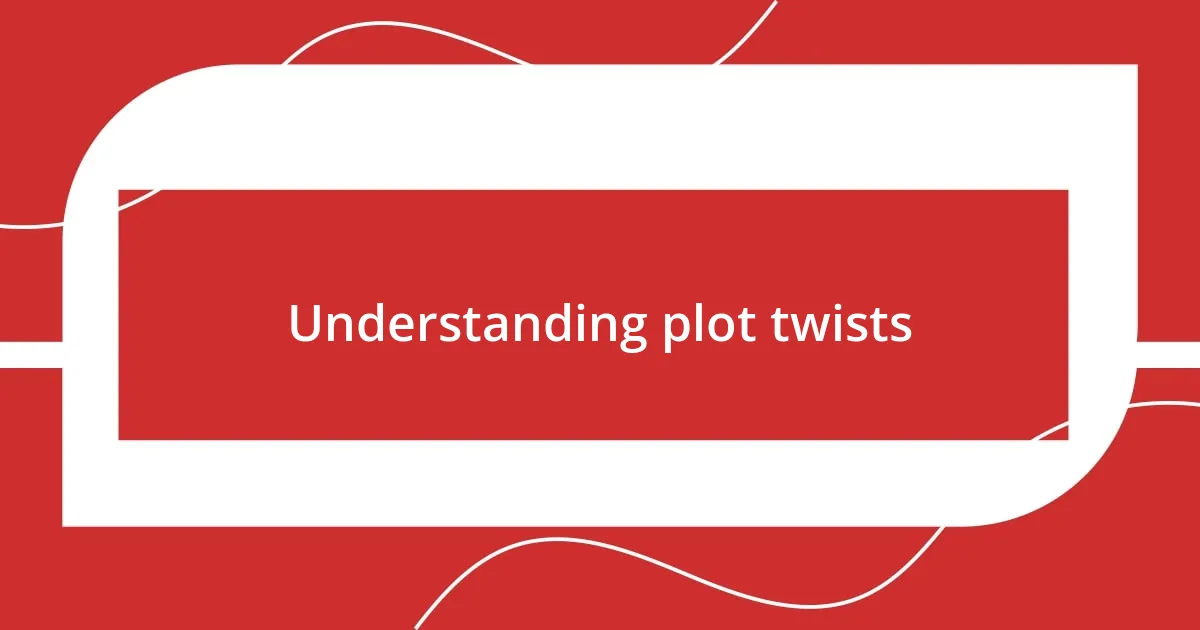
Understanding plot twists
Plot twists are those unexpected turns in narratives that can leave us reeling, and I find that they often transform the entire story. I remember watching a movie where a seemingly innocent character revealed a shocking secret. It was as if the ground fell away beneath me. Have you ever had a moment like that, where what you thought you knew was flipped on its head? It’s a testament to the power of well-constructed twists and how they resonate with our emotions.
When a plot twist is executed effectively, it not only surprises us but also challenges our assumptions. There’s something thrilling about realizing we’ve been misled, intentionally or not. It makes me appreciate the skill involved in writing. I often think about how a good twist can evoke a mix of awe and disbelief—like the time I read a book where the antagonist turned out to be the protagonist’s long-lost sibling. The emotional weight of that revelation stayed with me long after I closed the cover.
Furthermore, plot twists can serve as a reflection of real life. It’s fascinating how we often face unexpected changes, and narratives that capture these surprises resonate deeply. Isn’t it intriguing how a clever twist can mirror our experiences? They remind me of those moments when everything seems predictable, but life suddenly throws in a curveball, prompting us to reassess what we think we know.
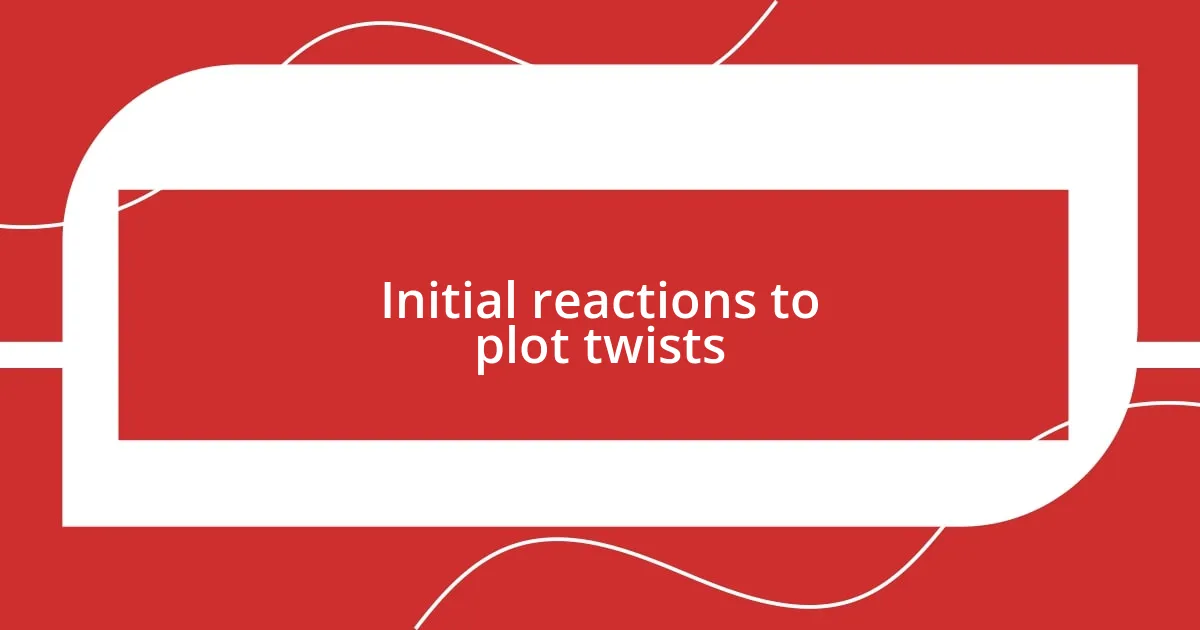
Initial reactions to plot twists
When I first encounter a plot twist, my immediate reaction often dances between shock and excitement. I recall a time watching a television series where a beloved character, who I thought was a hero, turned out to be the villain. It felt like my heart literally skipped a beat, and I couldn’t help but let out an audible gasp. Have you ever experienced a moment like that, where your mind races to comprehend the new reality?
The emotional rollercoaster can be abrupt. I find that some twists leave me questioning everything that came before it. It reminds me of a time when I read a novel that led me to believe one character was the main protagonist, only to discover they had been a mere pawn in someone else’s game all along. That sudden shift made me reflect on how vulnerable we can be to manipulation, even in fiction. It’s almost amusing when you think about how invested we become—jealous of the characters’ fates as if they were our own.
Interestingly, my reactions vary based on the story’s genre. For instance, in thrillers, I often find myself piecing together clues in my mind, anticipating that twist. But in romance, I may react more emotionally when a character’s secret is revealed, as those twists tend to resonate with my own experiences. How about you? What kind of twists leave you reeling the most?
| Genre | Initial Reaction |
|---|---|
| Thriller | Piecing clues together, anticipation grows |
| Romance | Emotionally invested, feelings tied to characters |
| Drama | Introspection and reflection on life experiences |
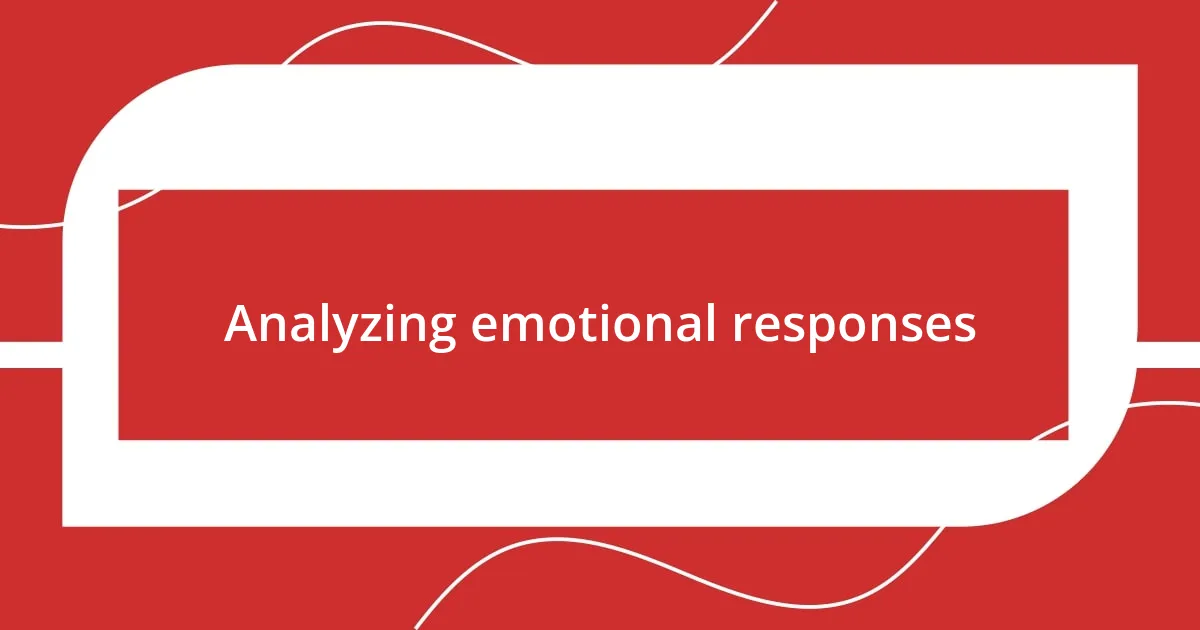
Analyzing emotional responses
I’ve found that analyzing my emotional responses to plot twists can be quite revealing. Each unexpected turn doesn’t just provoke surprise; it often taps into my personal experiences and fears. I recall watching a film where a character’s betrayal shattered the trust I’d built in their storyline. I think that’s what makes twists so powerful—they can mirror the complexities of relationships we encounter in real life.
- Shocking twists can stir feelings of betrayal, reflecting our own vulnerabilities.
- They might evoke nostalgia, reminding us of past experiences that parallel the storyline.
- Often, I notice a shift from disbelief to curiosity, leading me to re-evaluate earlier moments in the narrative.
In my experience, the emotional aftermath of a twist can linger long after the story ends. After I read a mystery novel that revealed a family secret, I felt compelled to reach out to my own relatives. I wanted to understand their untold stories, realizing that a twist in fiction can parallel our unvoiced truths. It’s this intertwining of narrative and personal history that allows plot twists to resonate deeply with us. How about you? Have any twists ever inspired you to reflect on your own life?
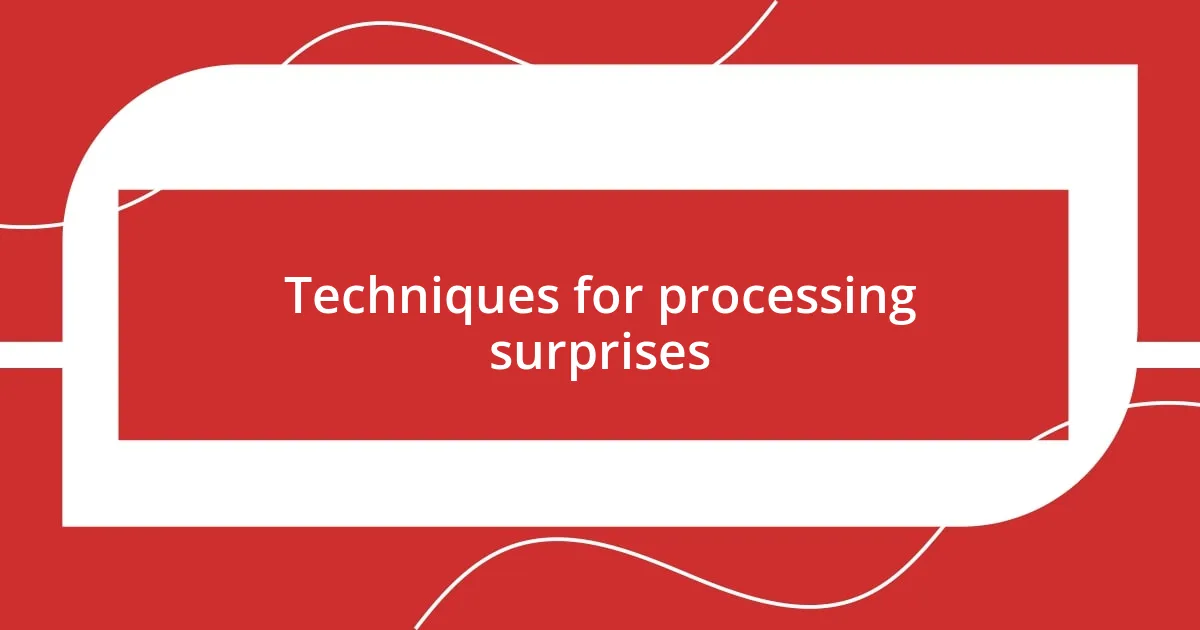
Techniques for processing surprises
Processing surprises in storytelling requires a blend of emotional engagement and analytical thinking. One technique I often employ is grounding myself in the narrative’s context. When faced with a shocking twist, I take a moment to recall earlier clues or character developments. This reflection not only helps me make sense of the twist but also enhances my appreciation for the writer’s craft. Have you ever paused to think back on earlier scenes? It can be like putting together a puzzle where the final piece changes your entire perception of the picture.
Another approach I find effective is discussing the twist with friends or fellow fans. Sharing different perspectives can illuminate aspects I may have overlooked, transforming confusion into excitement. I vividly remember watching a series finale with a group of friends, and we were all bubbling over with theories and reactions. The discussion not only eased the shock but also deepened our connection to the story. Isn’t it fascinating how collective processing can amplify our understanding and enjoyment?
Finally, journaling about my feelings and thoughts after encountering a major plot twist has become a vital practice for me. Writing allows me to dissect my emotional responses, almost like a therapy session. After witnessing a heart-wrenching twist in a novel, I spent an afternoon jotting down my reflections. That process opened up a flood of memories and feelings I hadn’t consciously acknowledged. Have you tried this method? It can be a rewarding way to explore how fiction intertwines with our real-life experiences.
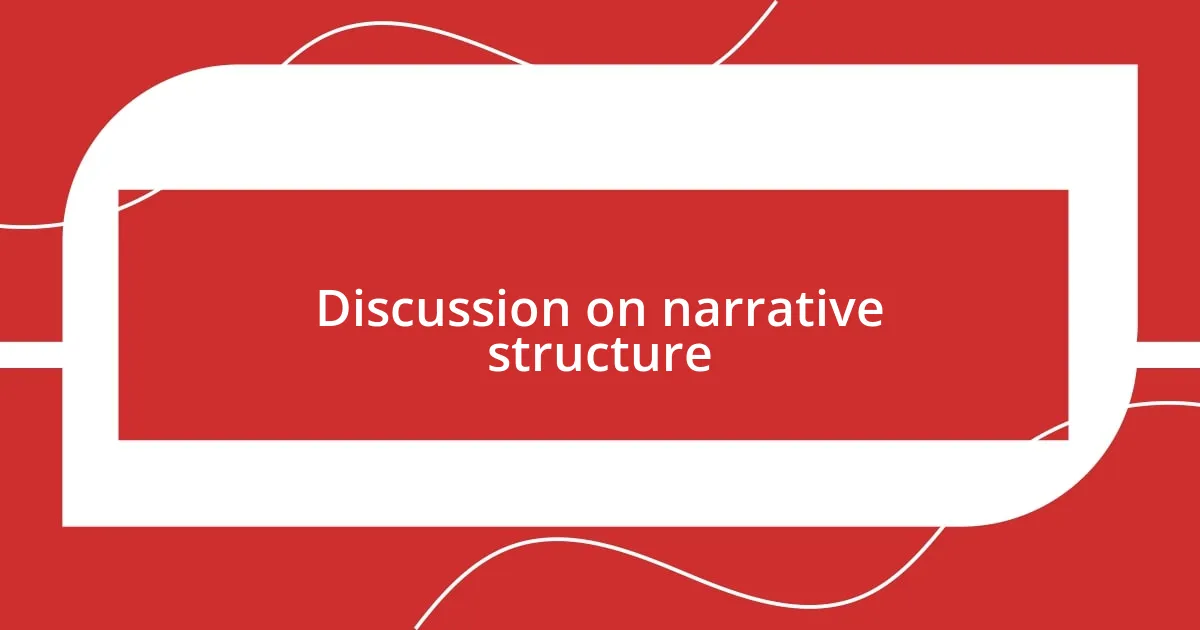
Discussion on narrative structure
The structure of a narrative is like the skeleton that supports the flesh of a story. When I think about plot twists, they often hinge on the setup established earlier in the narrative. I remember finishing a novel where the twist felt inevitable yet shocking. It suddenly became clear how subtly the author had woven clues into the characters’ dialogues. It left me pondering about how an expertly built narrative can lead readers down one path, only to pivot dramatically at the end. Isn’t it intriguing how those earlier hints can redefine our understanding?
The placement of a twist is critical within the overarching structure. I’ve noticed that twists positioned towards the end of a story create a profound impact on the reader’s experience. For instance, when a major revelation hit in a historical drama I watched, it brought everything I thought I knew crashing down in a matter of seconds. That jarring shift made me reevaluate the protagonist’s motivations and actions. It exemplified how timing can dictate not just the twist itself, but the emotional fallout that follows. Have you ever found yourself reflecting on the moments that led to such an eye-opening conclusion?
Reading different genres has made me aware of how narrative structures vary in delivering twists. In thrillers, I’m often left holding my breath as the plot unfolds with rapid pacing. In contrast, literary fiction allows more room for character development before a surprise moment hits. I once read a literary novel that lingered on the characters’ internal struggles, and when the twist finally arrived, it felt less shocking but more profound. It evoked a deeper understanding of the characters and their journeys. That’s the beauty of narrative structure—it shapes not only how a story unfolds but also how deeply it resonates with us. How has genre influenced your experience with plot twists?
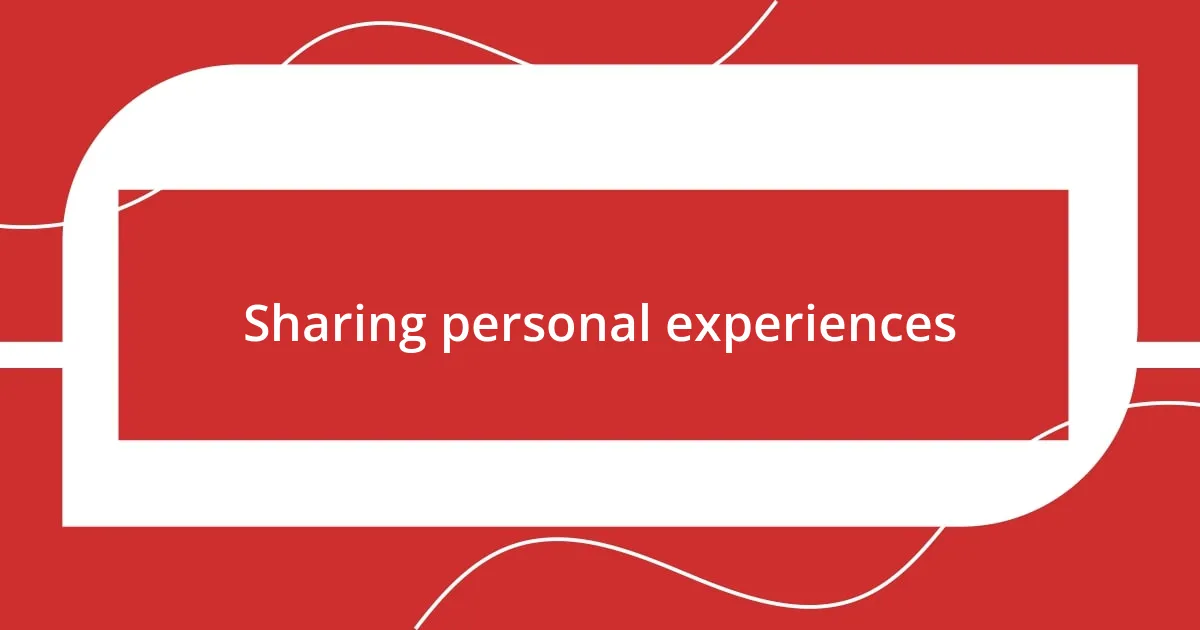
Sharing personal experiences
Sharing personal experiences is a powerful way to connect with others and process shocking plot twists. I remember the first time I watched The Sixth Sense. I was in total disbelief when the revelation hit me. I felt like I had missed an entire layer of the film—all of those subtle cues I had overlooked suddenly made perfect sense. Have you ever experienced that rush of realization that turns everything you thought you knew upside down?
Talking about these moments with friends can really enhance the experience. After finishing a gripping thriller together, my friends and I dove into an animated debate about what we’d just witnessed. Each of us had different interpretations of the motives behind the characters’ actions. That exchange not only clarified my confusion but also sparked a deeper appreciation for the storytelling. Is there something exhilarating about discovering fresh perspectives that you hadn’t considered?
There’s also something cathartic about writing down our thoughts after such revelations. I often jot down my immediate reactions and emotions in a dedicated journal. Reflecting on the layers of a plot twist can feel like peeling an onion—each layer revealing a new insight. I find it fascinating how these written thoughts echo my own experiences and emotions, making the storyline even more relatable. Have you ever tried jotting down your feelings after a shocking reveal? It might just illuminate aspects of the story you hadn’t grasped before.
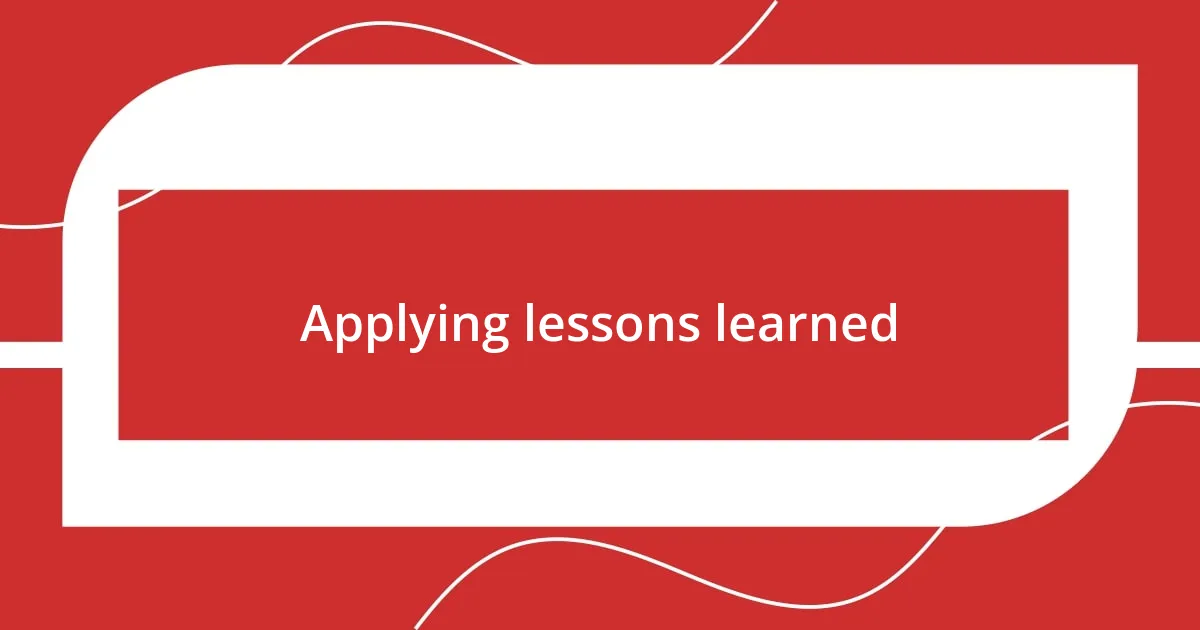
Applying lessons learned
Applying lessons from shocking plot twists can reshape our approach to storytelling and even our outlook on life. I remember after I finished reading Gone Girl, I was struck by how the twist not only changed my perception of the characters but also left me questioning the nature of trust. It was as if the book held a mirror to my own relationships, leading me to ponder: what hidden depths lie beneath the surface of those we think we know?
Engaging in discussions about these twists has taught me to appreciate the nuances of character development. I once attended a book club where we dissected a plot twist in a novel that had everyone gasping. One member pointed out how our initial judgments were refocused after understanding the protagonist’s complex emotions. That experience reinforced for me the idea that a twist often serves the purpose of deepening our empathy towards characters, making us reflect on our biases. Have you found that often, the twists serve as a vehicle for personal growth as much as narrative progression?
In my creative pursuits, I’ve started applying the lessons learned from these shocking moments to my writing. I attempt to layer clues within my own stories, guiding readers along a seemingly clear path before taking an unexpected turn. It’s exhilarating to craft an experience that surprises while inviting readers to rethink everything they’ve just absorbed. It leads me to wonder, how often do we, in our own lives, set up expectations only to be jolted by unexpected twists? Embracing uncertainty can truly enrich our narratives and personal experiences alike.
